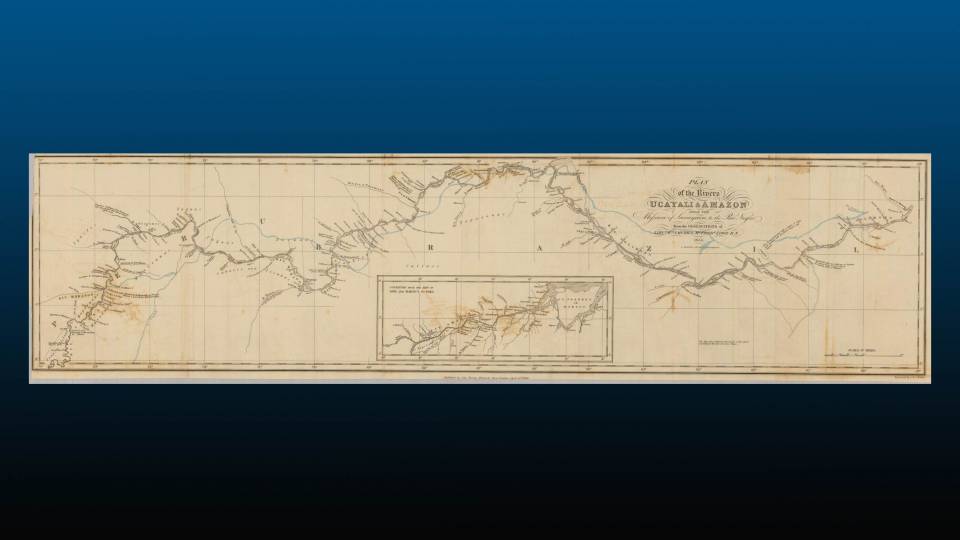Illegal gold mining threatens the environment and human health in the Amazon, said shaman and Yanomami Indigenous leader Davi Kopenawa in a talk at Princeton Jan. 31. And there are consequences for all of us, too, as mining in the Amazon rainforest diminishes one of the planet’s largest natural carbon sinks and a bastion of biocultural diversity.

Shaman and Yanomami Indigenous leader Davi Kopenawa speaks at a Princeton panel discussion Jan. 31, 2023. He and a group of Yanomami artists, activists and art curators were in the area for the Feb. 3 debut of "The Yanomami Struggle," an exhibition at The Shed cultural center in New York, which continues through April 16.
Kopenawa, who has been advocating for his people’s rights since the 1970s, is the author of "The Falling Sky: Words of a Yanomami Shaman" (2013, Belknap Press) and the president of the Hutukara Yanomami Association.
The Yanomami (“human-beings” in their language) are a group of 35,000 people who live across 250 villages deep inside the Amazon Forest in northern Brazil and parts of southern Venezuela. In 1992, after years of struggle against commercial encroachment, they won a major victory when the Brazilian government preserved more than 37,000 square miles for the Yanomami to continue their way of life and stewardship of the forest’s integrity.
Then, on a campaign stump in 2018, former president Jair Bolsonaro promised to open the Amazon for commercial exploitation. According to Brazil’s National Institute of Space Research, his four-year term saw 17,800 square miles of forest razed, an area approximately the size of Taiwan.
“I’m in mourning,” Kopenawa said at the beginning of his keynote address. “My people are dying.” Brazil’s new president, Luiz Inácio Lula da Silva, who took office in January, has promised to remedy the “absolutely urgent” situation, Kopenawa said.
Kopenawa later described the ways in which the struggle of the Yanomami have implications for humanity. “The whole world knows the importance of the Amazonian rainforest,” he said. “We are living here, on this Earth. It’s the only Earth we have for everybody.”
Kopenawa and fellow Yanomami were in the area for the Feb. 3 debut of "The Yanomami Struggle," an exhibition at The Shed cultural center in New York City, organized together with the Instituto Moreira Salles and the Fondation Cartier pour l'art contemporain. The show, which runs until April 16, explores the decades-long collaboration between photographer Claudia Andujar and the Yanomami people. The Princeton Institute for International and Regional Studies (PIIRS) Brazil LAB and the Department of Anthropology are organizing student trips to see the exhibition.

Amazonian Indigenous leader Davi Kopenawa (center) and a group of Yanomami visitors were welcomed by President Christopher L. Eisgruber (right) and others in a reception at Prospect House prior to the public event. Professor of Anthropology João Biehl is shown at left.
The evening event was kicked off with a reception held in Prospect House, where President Christopher L. Eisgruber welcomed Kopenawa and a group of Yanomami artists, activists and art curators. “Davi said to me that he comes from the people of the forest here to the ‘city’ to explain to us about other worlds and the obligations of care we have to the world that we all share,” Eisgruber said. “And I said, in this ‘city,’ what we do is to bring together many worlds.”
During the reception, Kopenawa also met with Amaney Jamal, dean of the Princeton School of Public and International Affairs, and Aly Kassam-Remtulla, vice-provost for International Affairs and Operations.
Noah Collins, a graduate student in anthropology from the Cherokee Nation and White Mountain Apache Tribe in Oklahoma, spoke at both the reception and the keynote event. “It’s one of the great privileges of being Indigenous to have relations and relatives all around the world, and to be able to share these experiences that are mirrored in the United States and other countries,” he said at the reception, welcoming the Yanomami delegation. “I think the way that we do things is what makes us special and unique and beautiful.”
Professor of Anthropology João Biehl commended “the unprecedented collective effort to bring Kopenawa to Princeton” in his opening remarks to the large audience at Chancellor Green Rotunda in a presentation also live-streamed on the Brazil LAB YouTube channel. “Kopenawa’s historic visit speaks to the fatal effects of Bolsonaro’s political-economic campaign of decimating the Indigenous foundations of livelihood,” he said.
Following Kopenawa’s keynote, Deborah Yashar, professor of politics and international affairs and PIIRS director, noted that “he forces us to think about the challenges posed not only by climate change, but also by greed and by politics in a fundamental way … what is, what is good, and what can be.”
In replying to Yashar’s question about the relation between Yanomami activism and art making, Kopenawa said, “before our Amazonian forest ends, we are drawing it … That’s why the Yanomami began drawing, for the sons and daughters, grandchildren and kin to see the beauty, to value our art and our struggle to protect the lungs of the Earth.”
During a Q&A session at the conclusion of the event, a student asked Kopenawa what she could do to help Yanomami cause. The Indigenous leader replied with a request that Princeton students write directly to President Joe Biden. “We need him to understand our fight, to have the willingness to give us value and be an ally.”
The event was co-organized by the Brazil LAB, the Princeton Institute for International and Regional Studies, the Department of Anthropology, the Department of Art & Archaeology, the Princeton University Art Museum, the Lewis Center for the Arts, the John H. Pace, Jr. '39 Center for Civic Engagement, the High Meadows Environmental Institute, the University Center for Human Values, the Princeton Humanities Council, the Program in Latin American Studies, the Department of Spanish and Portuguese, the Princeton School of Public and International Affairs, and the Effron Center for the Study of America.





